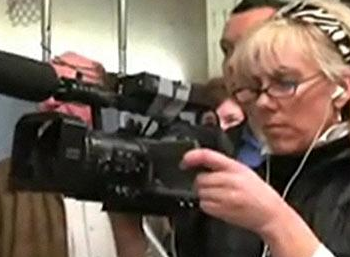Amy Jean Porter T-Shirt!

Awl Chief Drawing Person Amy Jean Porter has a new t-shirt for sale, from the series North American Mammals Speak the Truth and Often Flatter You Unnecessarily. It’s from this drawing and it’s got a jaguar who compliments you on your handwriting! In other news, Amy is finishing a very exciting book right now but she’ll return here before you know it.
The Savaging Of Clive James
You don’t have to be familiar with the work of cultural polymath Clive James to appreciate the brutal but restrained vivisection Christopher Tayler performs on the Great Man’s latest memoir (and, by extension, his transformation from “a writer with a powerful sense of the ridiculous slowly turning into someone with only a vestigial one”). It’s almost a master class in the form, and I say this as someone who is a huge fan of James’.
Flowers of Evil

It’s a funny thing, fidelity. Last week’s enormous bankruptcy-report filing on shady financial practices at the late Lehman Brothers investment house depicts an internal braintrust desperate to conceal reckless debt transactions and deceptive accounting practices from public view. The court-appointed examiner in the firm’s bankruptcy proceedings, Anton Valukas, found that senior Lehman officials tried to alert their bosses of blatant efforts to reclassify debt as “sales” under a recondite accounting trick known in house as “Repo 105”-so named because it permitted the company to assess buy-back transactions of assets sold for cash at a value representing 105% or more of the cash the company actually pulled in. And presto, Valukas observes: “Unbeknownst to the investing public, rating agencies, Government regulators, and Lehman’s Board of Directors, Lehman reverse engineered the firm’s net leverage ratio for public consumption.”
In other words, notes the Wall Street Journal reporting team of Mike Spector, Susanne Craig, and Peter Lattman, what normally would appear as debt exposure was minted, in the alchemy of creative internal accounting, into assets: “Assets shifted away from Lehman’s balance sheet, reducing the amount of debt it showed to investors.”
Months ahead of the firm’s September collapse, its global financial controller, Martin Kelly, had warned senior Lehman finance chieftains Erin Callan and Ian Lowitt that the transactions presented the firm with “reputational risk” should they come to the light of day; Kelly told Valukas, meanwhile, that “the only purpose or motive in the transactions was reduction in balance sheet” and “there was no substance in the transactions.” Lehman Chief Operating Office Bart McDade portrayed the deals rather more pithily in an April 2008 email; they were, he explained in the teen-inflected cyberspeak that investigators no doubt instantly recognized from the Jack Abramoff email archives [PDF], “another drug we r on.”
The Lehman deceits, of course, are only exceptional for their forensic detail-similar balance-book hijinks at other major Wall Street houses will take considerably longer to come fully to light, sloshing around as they are in an oversight-challenged state of TARP-turnaround. Still, the Valukas revelations also make for bracing reading alongside Vicky Ward’s expose of the weirdly obsessive Lehman domestic cult in Vanity Fair’s April “Money” issue. The piece, excerpted from Ward’s forthcoming book The Devil’s Casino, shows former Lehman head Dick Fuld taking a Captain Queeg-like interest in the stability and longevity of the marriages in the firm’s overwhelmingly male inner circle. After Fuld saw Karin Jack openly arguing with her husband Bradley, Lehman’s banking head (and later co-chief operating officer), Fuld continually pressed his colleague for reassurance on the state of his union. “He really wanted to know,” Karin recalled. “He didn’t think Brad and I looked happy enough. It really worried him.”
Signs of marital discord had been a companywide cause for worry ever since a palace coup in 1996 to topple Fuld’s predecessor, Chris Pettit, after Pettit abandoned the inhouse Lehman code of anxiously monitored fidelity to embark on an affair with a female Lehman colleague. It’s a well worn piece of company lore, Ward notes, that Fuld once scandalized a major client after a business dinner by refusing to spring for a post-prandial hooker.
But as is often the case with policers of marital rectitude, Fuld’s firm was much stronger on points of public etiquette than it was in the traditional understanding of what it is to be family-friendly. Karin Jack notes, for example, that her husband, after setting out to support her as she went into labor, was instead forced to turn around to attend a major client meeting in Hong Kong. After she was conscripted to handle a household move entirely on her own, she received a flower bouquet and a note of consolation from Lehman managing director Teddy Roosevelt IV (yes) that apologized because “all we do is steal your husband.”
This Foucauldian regime of total marital surveillance went into overdrive at the firm’s annual retreats in Sun Valley, Idaho. After being flown in on firm-owned jets, each couple was met by one in a vast armada of black S.U.V.’s. In the morning, the wives would be marshaled for punishing, competitive hikes up nearby Bald Mountain-Karin Jack recalls that Fuld himself would pantomime pushing her forward for the final upward stretch. (She once tried to shun hiking duty by faking a leg injury, replete with a phony cast-only to be one-upped by another go-getting Lehman wife who arrived in an actual leg cast and nevertheless professed her intention to march grimly up the mountain regardless.) When she awoke one morning to find that the hiking-wives’ corps had left without her, she instantly put Brad on alert that his star was in decline. (And she was right-he was demoted a few months later, and left the firm in 2005; the Jacks divorced in 2008, both informing Ward that the intrusive reach of the Fuld regime had irreparably harmed their marriage.) Small wonder that ambitious Lehman execs on the make would cannily trade their domestic partners up when they were perceived as a career liability; equities-division fella Joe Gregory, for instance, was divorced from his wife Teresa in 1999. The poor woman “didn’t fit in at the Lehman dinners,” one of Ward’s informants recalls; Joe took to abandoning her at Fuld family functions, Karin Jack remembers-”She needed help, guidance, and Joe didn’t give her any.”
By the following year, Joe had teamed with a recently divorced “Greek beauty” named Nicki Golod, who helped propel Joe into the front ranks of the high-living Lehman nomenklatura. She’d conduct detailed tours of her cavernous shoe closet when other Lehman wives would come calling to the couple’s spread in Huntington, Long Island; Joe, meanwhile, eschewed the LIRR for a seaplane and helicopter to navigate his daily commute, and appeared to relish telling his colleagues that his annual living expenses were in the $15 to $20 million range. Dinners at the Gregory home would mobilize a domestic staff of 30 kitchen and household workers.
One can’t help but be struck by how starkly these closely monitored pecuniary displays contrast with the haphazard state of the books that Lehman was nominally expected to treat as its main order of business. Clearly, the most effective way to signal your playerhood status to a Comstock-minded boss like Dick Fuld was to pile up your domestic holdings to a potlatch-style scale. But the tragic plight of the Lehman executive, of course, was that the transactions financing these suburban fortresses were, in market terms, the very kind of nonstarter that Joe Gregory’s first marriage proved to be. Still, you have to give this much to Dick Fuld: even as he presided over the gruesome Lehman endgame, he still hewed to his high ideals of domestic order. In Lehman’s final swoon in fall 2008, he’d imposed an inhouse gag rule forbidding comment on rumors of the firm’s impending sale, and he still had a female executive tasked with monitoring the condition of the flowers in the company meeting rooms. It would be a fitting gloss on his keen interest in the inner workings of marriage had he recalled that Lady Macbeth was scouring her hands not so much to remove the stain of blood as to mask its smell.
Chris Lehmann would like to remind you that his last name has two n’s.
Worrying About 1984 Is So 1995

Fifteen years ago, when we were all more vigilant citizens, raging against the machine with Goodie Mob and Rage Against the Machine, ranting about the fact that there are so many surveillance cameras in New York City that anytime you can see the Empire State Building, you can also be sure that you are being filmed, an op-ed in the Times arguing for the governmental institution of a universal DNA databank would have seemed terrifyingly Orwellian.
As a practical matter, universal DNA collection is fairly easy: it could be done alongside blood tests on newborns, or through painless cheek swabs as a prerequisite to obtaining a driver’s license or Social Security card. Once a biological sample was obtained, its use must be limited to generating a DNA profile only, and afterward the sample would be destroyed. Access to the DNA database would remain limited to law enforcement officers investigating serious crimes.
Oh, yes, I’m fully confident that access to the database would remain limited to law enforcement officers investigating serious crimes. But really, fuck it. Today, when such an article runs alongside a piece wherein Ross Douthat argues-very eloquently, as he does-that the Bush administration’s lying us into a war that cost hundreds of thousands of lives was actually not as evil as Hollywood movies make it out to be, and when stories in the Business section of the same paper inform you how best to broadcast your current location via satellite triangulation and other ways to share the vast amount of personal information we’re all so intent on putting onto the Internet, protest seems very, well, 20th Century. That ship has sailed. DNA samples? Sure, why not? And, yeah, I’ll take one of those bar-code tattoos on the back of my neck, too-and embed a homing-device microchip in my temple while you’re at it.
Highbrowing The Lowbrow
“A show like ‘The Bachelor’ is clearly produced to generate opinions, pro and con. It’s sort of stupid in a very smart way, purposefully deadpan, made to provoke people.”
-Former VH1 executive Michael Hirschorn encapsulates his entire programming philosophy in two succinct sentences.
ER Doctors Want To Steal Our Organs!

When you die in the ER, if you are an organ donor, your organs are not harvested! But now an emergency room-based project, funded by the organ-craving socialists at the Department of Health and Human Services, promises to steal away your organs before you are even brain dead, so as to save other people who need your kidneys and things. There are “questions”! From “some” who think ER doctors “might not do everything possible to save patients and may even hasten their deaths, to increase the chance of obtaining organs.” Yes. That’s how ER doctors are. Just ready to kill you for your eyeballs. Also? “Experts” are concerned that when people check “yes,” instead of “no,” on their driver’s licenses, in response to the question “would you like to be an organ donor,” maybe they are not understanding what that means? Some “experts” think that maybe some people think “organs” and “donor” are confusing? And they are just checking “YES TAKE MY ORGANS” willy-nilly? And so the world’s stupidest debate rages on, expressed in the world’s stupidest piece of Washington Post newspaper writing.
English Child Welshes on Pedo-Deal

Sexcrime Island is no longer a place one keeps one’s word, sad to say. When a family of a 4-year-old boy promised his sex-abusing maths teacher their silence about the crime in exchange for a downpayment on a house-£18,000, which was like half a million dollars in 2004 money but is like a small fistful of deli change today-they insufficiently ensured the silence of the kiddo. And now he’s spilled the beans, and everyone’s in trouble. Young people! They just aren’t being taught respect for agreements in that sad, sad country.
Dotcoms Now Old Enough To Rent A Car

Happy 25th anniversary of the first dotcom registration! Yes, it was on this day back in 1985 that Symbolics computers claimed the initial address on the Internets. And now? Take it away, some technology guy.
“It used to be, 10 years ago you could live an okay life if you weren’t engaged on a dot com site on a daily basis. You could get what you needed.
But today we see how dotcoms have enriched our lives that if you are not engaged you would be fine but much further behind than the rest of us.”
Woo hoo! That sure puts me in a celebratory mood. I can only imagine how much better things are going to get as we move forward!
Gosh That Was Windy Eh?

HOW WINDY WAS THAT? So windy, the Daily News tells us, that they can bring out the best metric ever: there were more 911 calls in New York City during a 24-hour period this weekend than there were on 9/11. But that’s hardly fair, since, you know, people could pretty much only text and you can’t text 911… yet. That’ll be amazing though, right, when we finally get there? “Thre is some1 in my hOuse w a knife1!! Comequick>… Sent from my Verizon Wireless BlackBerry.”
Gender Essentialist Rielle Hunter Speaks To Tabloid

The preface to the Rielle Hunter Tells All About Her Love Life with John Edwards story in GQ goes like this: “While everyone else in the Edwards drama has said their piece, in books and/or television interviews, the mistress and campaign videographer and mother of his child has, in her own words, ‘kept my mouth shut.’ Until now (as they say in the tabloids).” As they say in the what now? Heh. But the interview itself is a funny thing, and if the commenters at the Post are to be believed, she’s a horribly human being and a trashy whore and all kinds of things. But actually she’s an old-fashioned gal who’s not that different from most of us, except with some very rigid ideas of who women are and who men are.
For instance:
1. “One thing I’ve learned about relationships and men is that you can never walk across the room for a man.”
And:
2. “It’s beyond difficult. To allow a man to be a man. The biggest mistake that I find is that women attempt to make men women. You know, we want them to be like we are.”
Wow, more retrograde than Patti Stanger! And:
3. “I would change nothing about him. I would change, within myself, my, um, inability to be more accepting in certain areas. I get frustrated. And when I get frustrated-all under the story line that he’s not doing what I want him to do or he’s not acting the way I want him to act-I lose patience. So I would wish for more patience. Having a child helps with that. But it’s not him, it’s me. Because he’s doing the best he can. With the awareness level he has. He’s a man.”
Annnd also, enjoyably, she’s a media critic! On the subject of the National Enquirer:
4. “To me it shows, as a society, how cut off from the truth we are, that a magazine that pays their sources and every once in a while gets something factually correct is now eligible for a Pulitzer. Wow, we’re all going to hell.”
Well, here we are.
